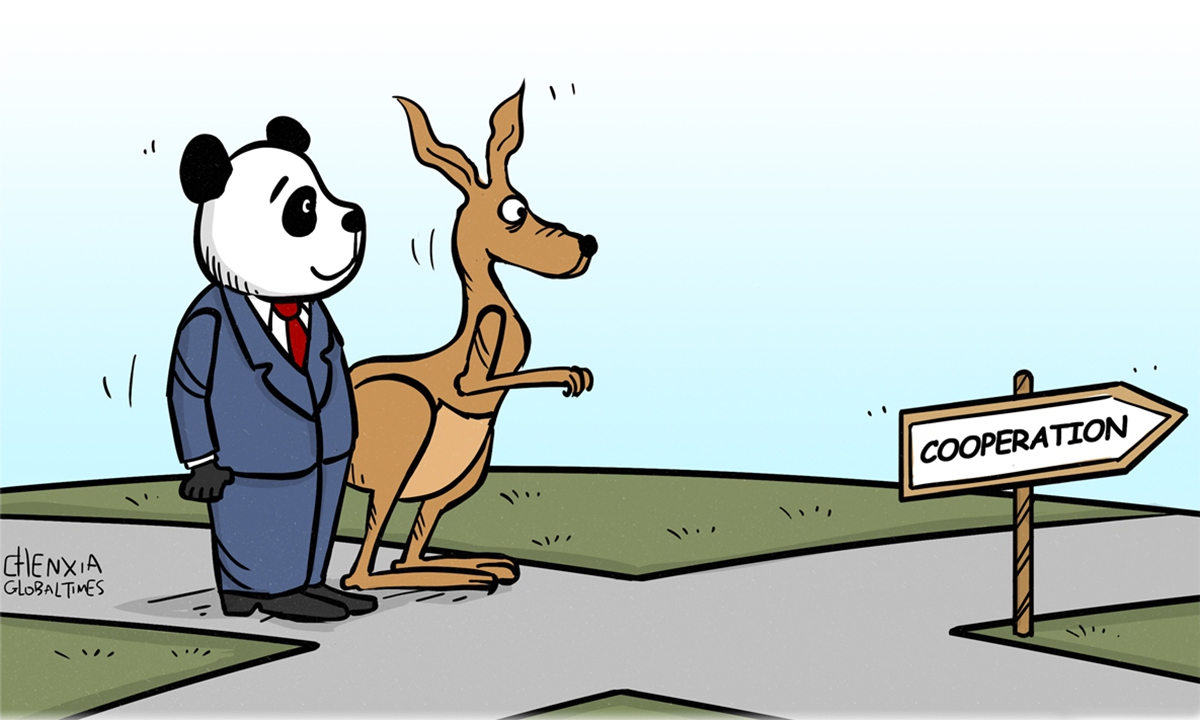Australia’s diplomatic journey: from hostility toward China to repairing the relationship

Illustration: Chen Xia/GT
Australian Prime Minister Anthony Albanese's visit to China has attracted the attention of Asia and the entire West. It is a clear signal that China and Australia have chosen to recalibrate their years-long strained bilateral relations. Australia is the first US ally to make a clear change in its attitude toward China after a fierce conflict with China since the US defined China as its No.1 strategic competitor.
Therefore, Albanese's visit to China and Australia's change in attitude toward China are extremely informative. Japan, South Korea, the Philippines, and even US allies in Europe, will think about themselves given the ups and downs of China-Australia relations.
Australia was once one of the countries with the most intense conflicts with China among US allies. This was entirely because Canberra was manipulated by Washington during the previous administration and became the vanguard of the US' attacks on China.
After the US launched a trade war against China, Australia set a bad precedent by becoming the first country in the world, in 2018, to ban the use of Huawei 5G equipment. I had a conversation with a senior Australian diplomat. The diplomat argued that Australia's policy on Huawei is the same as Japan's, but I pointed out that Australia was the first to implement the policy. His answer was: Someone had to do it first.
After 2020, Australia once again took the lead among Western countries, demanding the World Health Organization investigate the origin of the coronavirus. Its true intention was to cooperate with the US government to shift blame to China. At that time, it was clear to the whole world that the target of the investigation was China.
In other words, the deterioration of China-Australia relations was completely provoked by Australia as a lever for the US to contain China. China could not remain indifferent, and as a result, the bilateral relationship plummeted. Australia exaggerated the sentencing of a Chinese-Australian citizen on espionage charges in China, and its high-ranking officials made arrogant remarks on the Taiwan question, claiming that the Australian military should prepare to "join the US should Washington take action to defend Taiwan."
Against the backdrop of tense US-China relations, Australia signed the AUKUS agreement with the US and the UK. Both countries are assisting Australia in building several nuclear submarines. The interpretation of the entire Western world is that this move is aimed at China. China is Australia's largest trading partner, and the two countries have also signed a free trade agreement. However, suddenly, Australia had become one of the most confrontational countries with China in the Pacific.
The example of Australia shows the ability of the US in manipulating and mobilizing allies to confront China. But is this really beneficial for Australia? By completely aligning with the US and acting as its henchman, what does Australia hope to achieve? Due to the deterioration of China-Australia relations, bilateral trade has been severely affected. Australia claims to have suffered losses of billions of dollars, with exports of coal, timber, wine and lobsters significantly affected. In other words, the policy of unilaterally aligning with the US is extremely costly for Australia.
The US has many allies in the world, but those who take sides are mostly in the Asia-Pacific region because the US needs these allied countries to counter China. However, some US allies have are muddleheaded or opportunistic forces. Once in power, these forces tend to willingly act as pawns for the US and provoke China. But blindly appeasing the US and antagonizing China does not serve the interests of these countries. Once there is a change in leadership, the situation will also change. Australia, for example, has experienced a cycle of wavering policies toward China from the time Scott Morrison took office in 2018 until the change in government last year. The situations in the Philippines and South Korea are also very similar.
For China, how to deal with the "policy cycle" of US allies toward China has become a major issue. Obviously, we cannot tolerate the wrong behavior of US allies toward China. We ought to provide warnings and engage in combat. At the same time, we should take a long-term perspective and not solidify the tense relations with these countries, leaving room and possibilities for the future reconciliation of bilateral relations.
It is important for China to continue to develop and grow, as this is our greatest resource in attracting the world, including US allies, to maintain friendly or normal relations with China. China is almost the largest trading partner for all US allies in the Asia-Pacific region, which is a significant factor for these countries when making judgments between China and the US. The more realistic this factor is, the more difficult it is for these countries to wholeheartedly align with the US, and the broader the space for China to leverage.
The author is a media professional. opinion@globaltimes.com.cn


